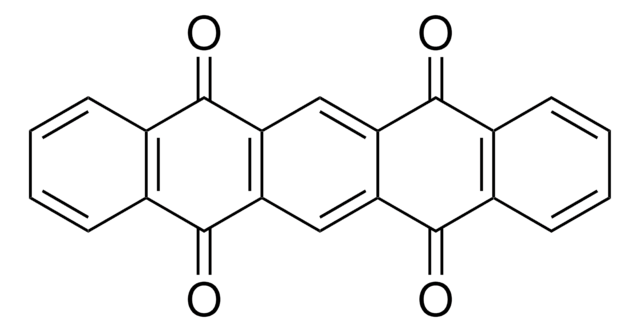113700
4,4′-Dichlorobenzophénone
99%
Synonyme(s) :
4,4′-DBP
Se connecterpour consulter vos tarifs contractuels et ceux de votre entreprise/organisme
About This Item
Formule linéaire :
(ClC6H4)2CO
Numéro CAS:
Poids moléculaire :
251.11
Numéro Beilstein :
643345
Numéro CE :
Numéro MDL:
Code UNSPSC :
12352100
ID de substance PubChem :
Nomenclature NACRES :
NA.22
Produits recommandés
Pureté
99%
Forme
solid
Point d'ébullition
353 °C (lit.)
Pf
144-146 °C (lit.)
Groupe fonctionnel
chloro
ketone
Chaîne SMILES
Clc1ccc(cc1)C(=O)c2ccc(Cl)cc2
InChI
1S/C13H8Cl2O/c14-11-5-1-9(2-6-11)13(16)10-3-7-12(15)8-4-10/h1-8H
Clé InChI
OKISUZLXOYGIFP-UHFFFAOYSA-N
Vous recherchez des produits similaires ? Visite Guide de comparaison des produits
Description générale
4,4′-Dichlorobenzophenone (DBP) is a metabolite obtained when one strain of ectomycorrhizal fungi, Xerocomus chrysenteron, degrades 1,1,1-trichloro-2,2-bis(4-chlorophe-nyl) ethane (DDT).
Code de la classe de stockage
11 - Combustible Solids
Classe de danger pour l'eau (WGK)
WGK 3
Équipement de protection individuelle
Eyeshields, Gloves, type N95 (US)
Faites votre choix parmi les versions les plus récentes :
Déjà en possession de ce produit ?
Retrouvez la documentation relative aux produits que vous avez récemment achetés dans la Bibliothèque de documents.
Les clients ont également consulté
Yi Huang et al.
Chemosphere, 92(7), 760-764 (2013-05-09)
One strain of ectomycorrhizal fungi, Xerocomus chrysenteron, had been investigated for its ability to degrade 1,1,1-trichloro-2,2-bis(4-chlorophe-nyl) ethane (DDT) by measuring unlabeled DDT and identifying its metabolites, and determining the mineralization of [(13)C]DDT in pure cultures. After 45d incubation, about 55%
C J Moudgal et al.
Environmental science & technology, 37(22), 5228-5235 (2003-12-06)
As part of the EPA's mission to protect the environment, chemicals of concern (CoCs) at Superfund or other hazardous waste sites are cleaned up based on their potential toxicity to humans and the surrounding ecosystem. Oftentimes, there is a lack
J A Bumpus et al.
Applied and environmental microbiology, 53(9), 2001-2008 (1987-09-01)
Extensive biodegradation of 1,1,1-trichloro-2,2-bis(4-chlorophenyl)ethane (DDT) by the white rot fungus Phanerochaete chrysosporium was demonstrated by disappearance and mineralization of [14C]DDT in nutrient nitrogen-deficient cultures. Mass balance studies demonstrated the formation of polar and water-soluble metabolites during degradation. Hexane-extractable metabolites identified
[Comitogenic and immunosuppressant action of p,p-DDT and its derivatives on phytohemagglutinin-stimulated human lymphocytes].
I S Nikolaeva et al.
Doklady Akademii nauk SSSR, 253(2), 503-505 (1980-01-01)
M Fernández et al.
Chemosphere, 41(6), 801-812 (2000-06-23)
A study into levels of contamination by organochlorine compounds (insecticides and PCBs) and heavy metals (Cd and Pb) in the water/sediment system of the Southeast Regional Park (SERP) in Madrid, Spain, has been carried out. Residue levels of xenobiotics were
Notre équipe de scientifiques dispose d'une expérience dans tous les secteurs de la recherche, notamment en sciences de la vie, science des matériaux, synthèse chimique, chromatographie, analyse et dans de nombreux autres domaines..
Contacter notre Service technique








